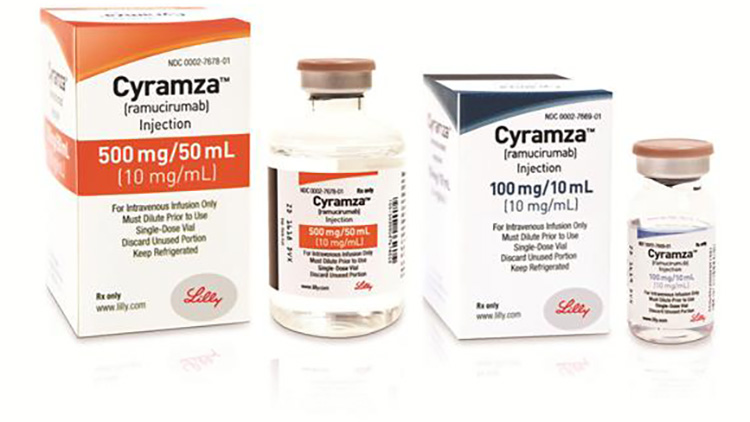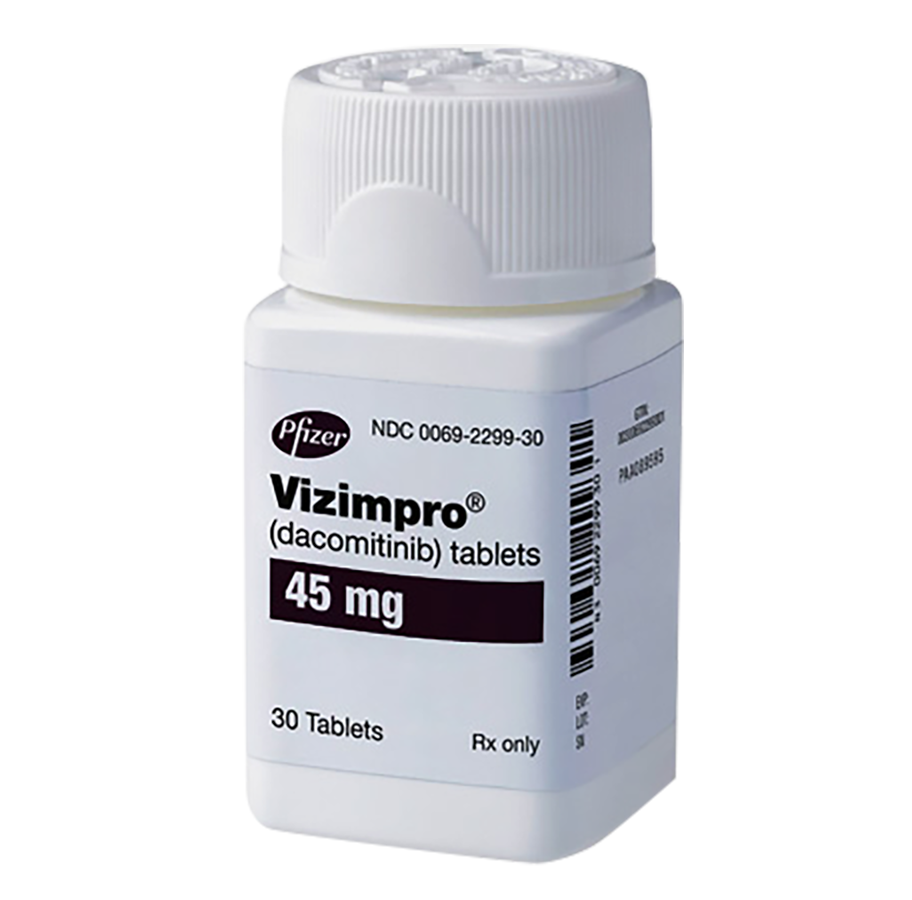Cyramza (ramucirumab) vs Vizimpro (dacomitinib)
Cyramza (ramucirumab) vs Vizimpro (dacomitinib)
Cyramza (ramucirumab) is a monoclonal antibody that works by targeting the vascular endothelial growth factor receptor 2 (VEGFR2), thereby inhibiting the blood supply to tumors and is commonly used for the treatment of certain types of gastric or gastroesophageal junction adenocarcinoma, metastatic non-small cell lung cancer (NSCLC), and metastatic colorectal cancer. Vizimpro (dacomitinib) is a small molecule tyrosine kinase inhibitor that targets the epidermal growth factor receptor (EGFR) and is used for the first-line treatment of patients with metastatic NSCLC with EGFR exon 19 deletion or exon 21 L858R substitution mutations. When deciding between the two, it is essential to consider the specific type and molecular characteristics of the cancer, as well as the patient's overall health and treatment goals, since each medication is tailored to different targets and types of cancer.
Difference between Cyramza and Vizimpro
| Metric | Cyramza (ramucirumab) | Vizimpro (dacomitinib) |
|---|---|---|
| Generic name | ramucirumab | dacomitinib |
| Indications | Gastric cancer, non-small cell lung cancer, colorectal cancer, hepatocellular carcinoma | Non-small cell lung cancer |
| Mechanism of action | Angiogenesis inhibitor by VEGFR-2 antagonism | Epidermal growth factor receptor (EGFR) tyrosine kinase inhibitor |
| Brand names | Cyramza | Vizimpro |
| Administrative route | Intravenous | Oral |
| Side effects | Hypertension, diarrhea, headache, hyponatremia | Diarrhea, rash, paronychia, stomatitis |
| Contraindications | Hypersensitivity to ramucirumab or any component of the formulation | Hypersensitivity to dacomitinib or any component of the formulation |
| Drug class | Monoclonal antibody, VEGF inhibitor | Tyrosine kinase inhibitor |
| Manufacturer | Eli Lilly and Company | Pfizer Inc. |
Efficacy
Cyramza (Ramucirumab) Efficacy in Lung Cancer
Cyramza (ramucirumab) is a monoclonal antibody that targets the vascular endothelial growth factor receptor 2 (VEGFR2), which is involved in the formation of blood vessels that supply tumors with oxygen and nutrients (angiogenesis). In the context of lung cancer, specifically non-small cell lung cancer (NSCLC), Cyramza has shown efficacy in improving outcomes when used in combination with chemotherapy. Clinical trials have demonstrated that Cyramza, when added to docetaxel chemotherapy, improves overall survival in patients with advanced or metastatic NSCLC that has progressed after initial chemotherapy treatment. This benefit has been observed in a broad patient population, including those with different histological types of NSCLC.
The efficacy of Cyramza was established in a pivotal phase III clinical trial known as the REVEL study. This trial included patients with stage IV NSCLC who had disease progression during or after one prior platinum-based chemotherapy regimen. The addition of Cyramza to docetaxel was associated with a significant improvement in overall survival compared to docetaxel alone. Median overall survival was extended by 1.5 months, and progression-free survival was also improved with the combination therapy. These results support the use of Cyramza as a second-line treatment option for patients with advanced NSCLC.
Vizimpro (Dacomitinib) Efficacy in Lung Cancer
Vizimpro (dacomitinib) is an oral, small molecule tyrosine kinase inhibitor designed to selectively inhibit the epidermal growth factor receptor (EGFR), a pathway known to play a critical role in the development and progression of certain types of NSCLC. Vizimpro has demonstrated efficacy as a first-line treatment for patients with NSCLC harboring EGFR exon 19 deletions or exon 21 L858R substitution mutations, which are common driver mutations in this cancer type. In clinical trials, Vizimpro has shown a significant improvement in progression-free survival compared to other EGFR inhibitors, such as gefitinib, in patients with previously untreated, advanced NSCLC with EGFR mutations.
The key study underpinning the approval of Vizimpro was the ARCHER 1050, a phase III clinical trial. This study directly compared the efficacy of Vizimpro to gefitinib in the first-line treatment of patients with advanced NSCLC with EGFR mutations. Vizimpro significantly extended the median progression-free survival by several months compared to gefitinib. Moreover, the overall response rate was higher in patients treated with Vizimpro, indicating a greater proportion of patients experienced tumor shrinkage. These results establish Vizimpro as a potent option for the targeted treatment of EGFR-mutant NSCLC.
Regulatory Agency Approvals
Cyramza
-
European Medical Agency (EMA), European Union

-
Food and Drug Administration (FDA), USA

-
Health Canada

-
Therapeutic Goods Administration (TGA), Australia

-
Medsafe (NZ)

Vizimpro
-
European Medical Agency (EMA), European Union

-
Food and Drug Administration (FDA), USA

Access Cyramza or Vizimpro today
If Cyramza or Vizimpro are not approved or available in your country (e.g. due to supply issues), you can access them via Everyone.org.
How it works

Make an enquiry
Choose the medicine you want to buy, answer a couple of questions, and upload your prescription to speed things up. We’ll get back to you within 24 hours.


Make an enquiry
Choose the medicine you want to buy, answer a couple of questions, and upload your prescription to speed things up. We’ll get back to you within 24 hours.


Breeze through the paperwork
We'll guide you through the required documents for importing unapproved medicine, ensuring you have all the necessary information.


Get a personalized quote
We’ll prepare a quote for you, including medicine costs and any shipping, administrative, or import fees that may apply.


Receive your medicine
Accept the quote and we’ll handle the rest - sourcing and safely delivering your medicine.

Some text on this page has been automatically generated. Speak to your physician before you start a new treatment or medication.
Let's talk
If you have any questions, call us or send us a message through WhatsApp or email:
Contact us




